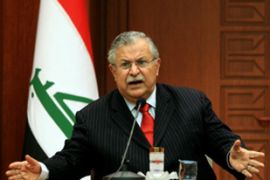Iraq president rejects election law
Talabani says he will not accept the bill after Kurdish MPs boycotted vote.

The US voiced its concern at the decision, saying that “local elections would help in Iraq to further reconcile all the groups,” adding that they wanted to see Iraq complete provincial elections “before the end of the year”.
“They have tensions amongst the different parties much like we have here [in the US] … and they’re trying to work through them … They just have a lot to work through,” White House press secretary, Dana Perino, told reporters on Wednesday.
Iraq’s 275-member parliament adopted the law on Tuesday, but parliament’s main Kurdish bloc, which has 54 members in the assembly, as well as a number of MPs from the Shia Supreme Iraqi Islamic Council, boycotted the vote over a secret ballot held on a section dealing with the disputed oil-rich city of Kirkuk.
Kurdish objections
The Kurdish bloc opposed the equal distribution of provincial council seats among Kurds, Turkomen and Arabs in the Kirkuk region – outside Kurdish territory but considered by many Kurds to be part of their historical land.
The law would see the transfer of security responsibilities in Kirkuk to military units brought from central and southern Iraq instead of the units currently in the city, an apparent move against Kurdish peshmerga forces deployed heavily in the area.
The Kurdish Regional Government, which oversees the three provinces that make up its semiautonomous territory, pinned its criticism on a decision by Mahmoud al-Mashhadani, the Sunni Arab parliamentary speaker, to hold the secret ballot on the Kirkuk section of the law.
In a statement, the Kurdish Regional Government called the secret vote a “constitutional breach” and a violation of parliamentary rules.
“We declare that the Kurdistan region is not bound by the results of this unconstitutional process … We demand that the parliament, the president and the presidential council oppose these suspicious projects that serve non-Iraqi agendas.”
“We appeal to all … sons of the Kurdistan region to stand in one line to foil this serious conspiracy,” it added, in a plea that appeared directed at Talabani.
Election delays
Iraq’s electoral commission had already said that provincial elections, due to be held by October 1, needed to be delayed until December 22, because the country was not ready.
An electoral commission official said that the delay could be even longer: “If the law is not approved in the coming week, then the date will be changed to sometime in 2009.”
The provincial elections are aimed at redistributing power in Iraq’s 18 provinces in what is considered a necessary step in the national reconciliation process.
Many Sunni Arabs boycotted provincial balloting in January 2005, enabling Shia Iraqis and Kurds to win a disproportionate share of power.